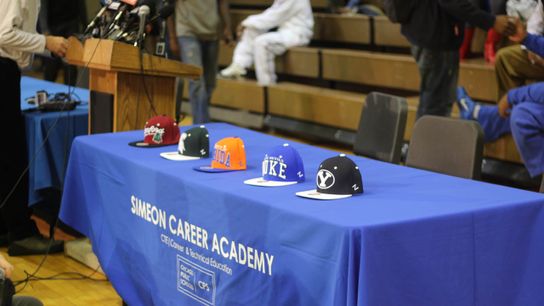There are a variety of similarities between the evaluation process at the NFL and collegiate levels, but there are also a number of differences. Year after year, the off season always seems to be littered with news of arrests on college campuses across the country, and that brought up an interesting conversation: Should your program be doing background checks on recruits?
In a piece on ESPN published by Adam Rittenberg and Alex Scarborough, the two explored the topic. At the NFL level leading up the the draft, teams can ask anything - no question is too intrusive, and nothing is off limits. The article even points out that Dolphins GM Jeff Ireland asked Dez Bryant during his evaluation if his mother was a prostitute.
The college process is clearly a lot different, because that kind of thing would never fly when the kid has the power to choose wherever he wants to go. Coaches spend weeks, months, and years driving, flying, and climbing trees chasing talented prospects, selling their program and college or university, while trying to convince each kid that their program is where they should be. However, unlike the NFL, once all the options are on the table, the choice is ultimately up to the individual. Based on that simple fact, the college recruiting process will never completely line up with the one the NFL uses because if the recruit doesn't like the evaluation questions being asked, then they can just take their talent somewhere else.
Guys don't have that option if they want to play in the NFL.
However, one thing that coaches and talent evaluators can't hide from at either level is talented players with baggage. Dan Mullen notes in the piece that figuring out which guys are worth that baggage that they bring with them is "the hardest thing you'll do."
"You have to draw the line somewhere," Mullen told ESPN. "There's a point where the guy doesn't want to help himself or it's too big of an issue for me.
"You're saying, 'Even though I want to help this kid, I can't expose my program to that.'"
Nearly all college programs talk with other coaches, counselors, teachers, administrators, and others to get a better idea about the level of a recruit's character, any red flags he might have, and how he'd fit in on their campus. Just drawing a conclusion based on the conversations you've had with him on the phone isn't enough. How that same young man interacts with people in his everyday life at school and within the community is a much better standard for how he'll act over the next four or five years on your campus.
Many colleges already use Google and other search tools to find information on guys that they don't voluntarily offer up, and surveillance of social media accounts is becoming more and more common by the day. But how far should this go process go? Should you be flat out asking about past legal issues and submitting requests for official background checks involving a look at a minor's criminal record?
TCU and Oklahoma are among a small number of programs that actually conduct formal background checks on their recruits, and they've been doing it the past 10 years. At OU, prospects submit their social security numbers and driver's license numbers, and the compliance then sends them to an outside company and five days later the check comes back with anything that happened in the public eye and how it was handled.
The article points out that a mid-level background check of 250 recruits would cost the program about a half a million dollars, and even that doesn't assure you that once the kid is away from home surrounded by temptations that college kids face that he'll stay out of the news.
While a small number of programs have decided to shell out the money for the background checks, others feel like if coaches are doing a good job leaving no stone unturned during the recruiting process, that they'll be able to uncover any potential red flags.
Where do, and your program, stand on the issue? Are background checks becoming a legit part of the evaluation process, or should you be able to find out enough about the kid during the recruiting process to decide whether he's a good fit or not from a character perspective?
